Unit 3 Could you please tell me where the restrooms are?Section B (2a~2d) 课件+嵌入音频 (共25张PPT)
文档属性
| 名称 | Unit 3 Could you please tell me where the restrooms are?Section B (2a~2d) 课件+嵌入音频 (共25张PPT) |
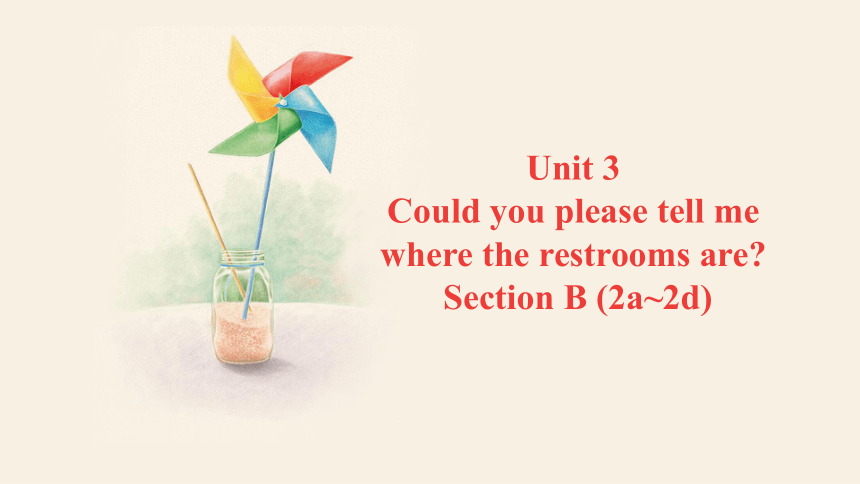
|
|
| 格式 | pptx | ||
| 文件大小 | 4.3MB | ||
| 资源类型 | 教案 | ||
| 版本资源 | 人教新目标(Go for it)版 | ||
| 科目 | 英语 | ||
| 更新时间 | 2023-12-13 00:00:00 | ||
图片预览

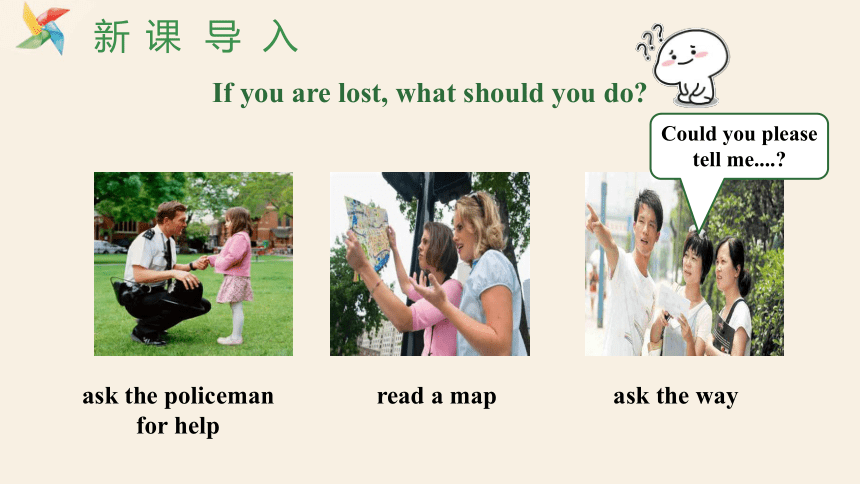
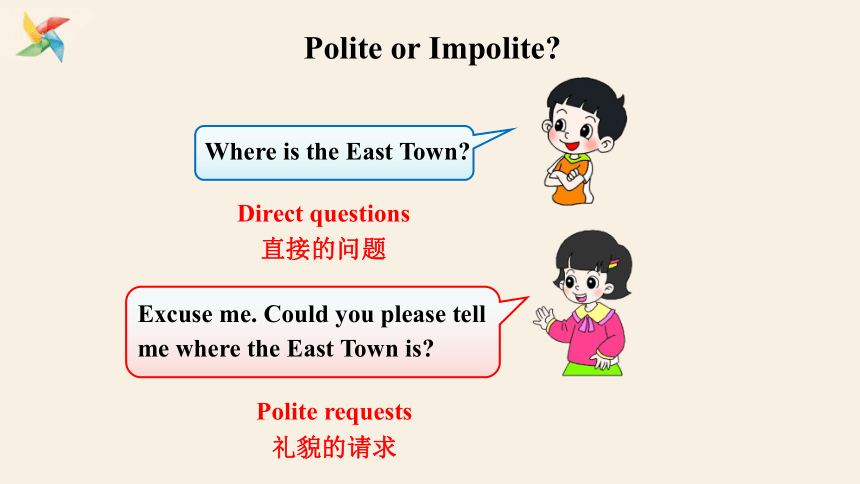

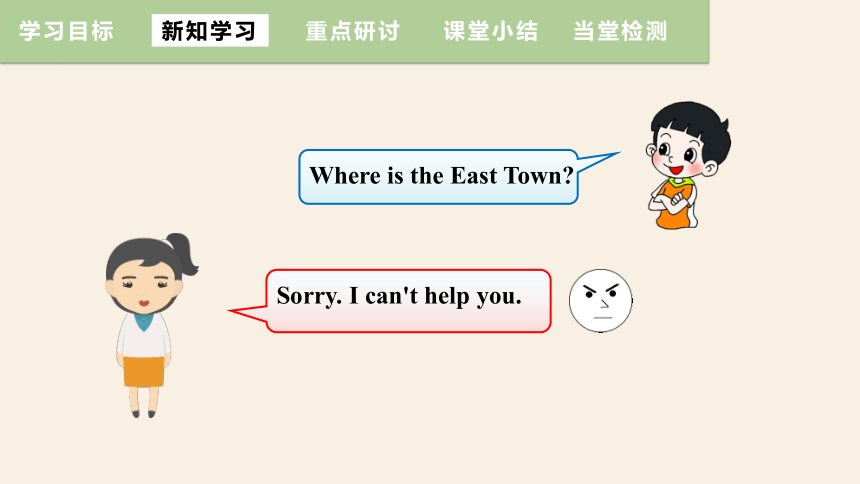

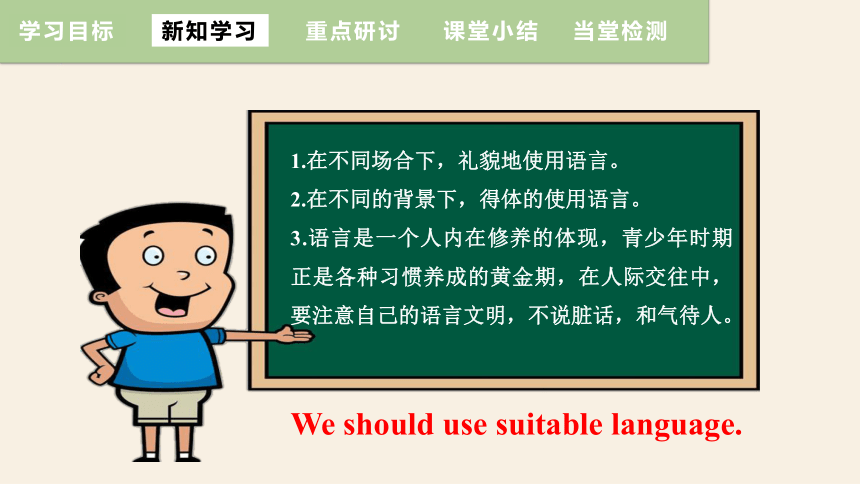
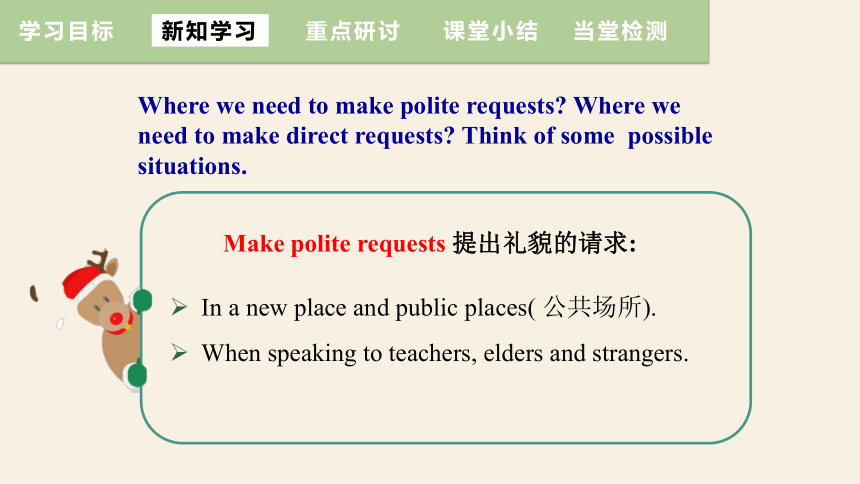
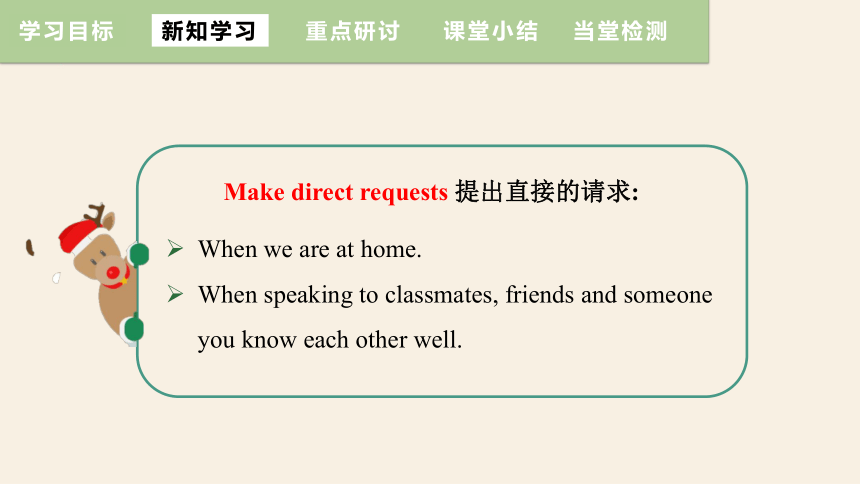
文档简介
(共25张PPT)
Unit 3
Could you please tell me
where the restrooms are
Section B (2a~2d)
新
课
导
入
If you are lost, what should you do
ask the policeman
for help
read a map
ask the way
Could you please tell me....
Where is the East Town
Polite or Impolite
Direct questions
直接的问题
Polite requests
礼貌的请求
Excuse me. Could you please tell me where the East Town is
Language Goal
新知学习
课堂小结
当堂检测
学习目标
重点研讨
1.能熟悉并能正确运用本课时的重点单词、短语
和重点句子
2.能运用礼貌用语 “Could you please tell me...
Excuse me, I wonder if...”等向别人提出请求
Where is the East Town
Sorry. I can't help you.
新知学习
课堂小结
当堂检测
学习目标
重点研讨
Excuse me. Could you please tell me where the East Town is
Sure. Take No. 23 Bus and you will get there.
新知学习
课堂小结
当堂检测
学习目标
重点研讨
1.在不同场合下,礼貌地使用语言。
2.在不同的背景下,得体的使用语言。
3.语言是一个人内在修养的体现,青少年时期正是各种习惯养成的黄金期,在人际交往中,要注意自己的语言文明,不说脏话,和气待人。
We should use suitable language.
新知学习
课堂小结
当堂检测
学习目标
重点研讨
Where we need to make polite requests Where we need to make direct requests Think of some possible situations.
Make polite requests 提出礼貌的请求:
In a new place and public places( 公共场所).
When speaking to teachers, elders and strangers.
新知学习
课堂小结
当堂检测
学习目标
重点研讨
Make direct requests 提出直接的请求:
When we are at home.
When speaking to classmates, friends and someone you know each other well.
新知学习
课堂小结
当堂检测
学习目标
重点研讨
新知学习
课堂小结
当堂检测
学习目标
重点研讨
Sometime we should make polite requests. But is it the same all the time
Pass me the ball !
Excuse me,Tom. Could you please pass me the ball
新知学习
课堂小结
当堂检测
学习目标
重点研讨
Pre-reading
Sometime we should make polite requests. But it is not the same all the time!
USING SUITABLE LANGUAGE
In different situations, you need to choose and use suitable language based on cultural knowledge.
新知学习
课堂小结
当堂检测
学习目标
重点研讨
2b
Read the article and find the topic sentence for each paragraph.
Paragraph 1
Paragraph 4
Paragraph 3
Paragraph 2
Usually the first sentence is the topic sentence.
Pay attention to the signal words(信号词).
新知学习
课堂小结
当堂检测
学习目标
重点研讨
When you visit a foreign country, it is important to know how to ask for help politely. For example, you may ask “Where are the restrooms ” or “Could you please tell me where the restrooms are ” These are similar requests for directions. Both are correct, but the first one sounds less polite. That is because it is a very direct question. It is not enough to just ask a question correctly. We also need to learn how to be polite when we ask for help.
Could you please ...
reading
新知学习
课堂小结
当堂检测
学习目标
重点研讨
Good speakers change the way they speak in different situations. The expressions they use might depend on whom they are speaking to or how well they know each other. It is all right to ask your classmates direct questions because you know them well. However, if you say to your teacher, “When is the school trip ”, this might sound impolite. But if you say, “Excuse me, Mr. West. Do you know when the school trip is ”, this will sound much more polite.
新知学习
课堂小结
当堂检测
学习目标
重点研讨
Usually polite questions are longer. They include expressions such as “Could you please ... ” or “May I ask ... ” It sounds more polite to say, “Peter, could you please tell me your e-mail address ” than “Peter, tell me your e-mail address.” Sometimes we even need to spend time leading into a request. For example, we might first say to a stranger, “Excuse me, I wonder if you can help me” or “I’m sorry to trouble you, but ...” before asking for help.
新知学习
课堂小结
当堂检测
学习目标
重点研讨
It might seem more difficult to speak politely than directly. However, it is important to learn how to use the right language in different situations. This will help you communicate better with other people.
新知学习
课堂小结
当堂检测
学习目标
重点研讨
2c
Find all the direct questions and polite requests from the passage.
Direct questions Polite request
Peter, tell me your e-mail address.
Where are the restrooms
When is the school trip
Could you please tell me where the restrooms are
Excuse me , Mr. West, do you know when the school trip is
Peter, could you please tell me your e-mail address
新知学习
课堂小结
当堂检测
学习目标
重点研讨
2d
Read the requests below. In the second column, write A if you would say it to someone you know and B if you would say it to a stranger. In the last column, write where you think these people are.
Request Person Place
1. Will you pass the salt
2. Do you know where I can change some money, please
3. Could you tell me what just happened
A
home
B
street
A/B
any public place/home
新知学习
课堂小结
当堂检测
学习目标
重点研讨
Request Person Place
4. Can you please tell me where the nearest station is
5. Excuse me, do you know what time it begins, please
6. Let me know when you’re ready, OK
7. Could you possibly tell me the way to the village school
B
street
B
movie theater
A
home
B
street
新知学习
课堂小结
当堂检测
学习目标
重点研讨
Language points
1. When you visit a foreign country, it is important to know how to ask for help politely.
politely作副词,意为“礼貌地;客气地”,其反义词为impolitely(无礼地;粗鲁地);polite是其形容词形式,反义词为impolite(无礼的)。
常用结构:be polite to sb. 意为“对某人有礼貌”。
It's polite to do sth. 意为“做某事是有礼貌的”
e.g. The little boy asked me for help politely.
那个小男孩客气地向我寻求帮助。
新知学习
课堂小结
当堂检测
学习目标
重点研讨
2. These are similar requests for directions.
request可数名词,其后常跟for,意为“要求/请求…”
request可用作及物动词,其用法有:
①request sth.(from sb.)向某人请求…
②request sb. to do sth.请求某人做某事
③request+that从句(从句用虚拟语气)
e.g. He requested some hot water from me. 他向我要了些热水。
新知学习
课堂小结
当堂检测
学习目标
重点研讨
3. They include expressions such as “Could you please ... ” or “May I ask ... ”
include 作及物动词,意为“包括;包含”。
e.g. The price includes both the house and the furniture inside.
这个价格包括房子和里面的家具。
including 用作介词,意为“包括;包含在内”,后接名词、代词或动词-ing形式。
e.g. Six people, including a baby, were injured in the accident.
事故中有6人受伤,其中包括一名婴儿。
included 形容词,意为“包括在内的”,通常置于名词之后。
e.g. There are 100 people in this school, 20 teachers included.
这所学校有100个人,包括20名老师。
新知学习
课堂小结
当堂检测
学习目标
重点研讨
4. Sometimes we even need to spend time leading into a request.
spend表示“花费”的两种常见结构:
(1)spend+时间/金钱+(in)doing sth.
(2)spend+时间/金钱+on sth.
lead动词,意为“引领”。
【辨析】lead to/lead in/ lead into
lead to 意为“导致;通向”; lead in 意为“导入;领先”;
lead into意为“引导;通向”。
新知学习
课堂小结
当堂检测
学习目标
重点研讨
Unit 3
Section B (2a~2d)
key phrases:
______________________________________________
______________________________________________
______________________________________________
make polite requests
a very direct question
ask for help
in different situations
lead into a request
communicate better with
key sentences:
__________________________________
__________________________________
__________________________________
__________________________________
Could you please ...
May I ask...?
Excuse me, I wonder if you can help me...
I’m sorry to trouble you, but...
新知学习
课堂小结
当堂检测
学习目标
重点研讨
用所给单词的适当形式填空。
1.Talking loudly in public is ________(polite).
2.Jack finds it difficult to pronounce some English words ________ (correct).
3.I'm sorry __________(break)your cup.
4.We should spend an hour _________ (exercise)every day to keep fit.
5.Let me teach you how ________ (use)Wechat.
correctly
to break
exercising
to use
impolite
Unit 3
Could you please tell me
where the restrooms are
Section B (2a~2d)
新
课
导
入
If you are lost, what should you do
ask the policeman
for help
read a map
ask the way
Could you please tell me....
Where is the East Town
Polite or Impolite
Direct questions
直接的问题
Polite requests
礼貌的请求
Excuse me. Could you please tell me where the East Town is
Language Goal
新知学习
课堂小结
当堂检测
学习目标
重点研讨
1.能熟悉并能正确运用本课时的重点单词、短语
和重点句子
2.能运用礼貌用语 “Could you please tell me...
Excuse me, I wonder if...”等向别人提出请求
Where is the East Town
Sorry. I can't help you.
新知学习
课堂小结
当堂检测
学习目标
重点研讨
Excuse me. Could you please tell me where the East Town is
Sure. Take No. 23 Bus and you will get there.
新知学习
课堂小结
当堂检测
学习目标
重点研讨
1.在不同场合下,礼貌地使用语言。
2.在不同的背景下,得体的使用语言。
3.语言是一个人内在修养的体现,青少年时期正是各种习惯养成的黄金期,在人际交往中,要注意自己的语言文明,不说脏话,和气待人。
We should use suitable language.
新知学习
课堂小结
当堂检测
学习目标
重点研讨
Where we need to make polite requests Where we need to make direct requests Think of some possible situations.
Make polite requests 提出礼貌的请求:
In a new place and public places( 公共场所).
When speaking to teachers, elders and strangers.
新知学习
课堂小结
当堂检测
学习目标
重点研讨
Make direct requests 提出直接的请求:
When we are at home.
When speaking to classmates, friends and someone you know each other well.
新知学习
课堂小结
当堂检测
学习目标
重点研讨
新知学习
课堂小结
当堂检测
学习目标
重点研讨
Sometime we should make polite requests. But is it the same all the time
Pass me the ball !
Excuse me,Tom. Could you please pass me the ball
新知学习
课堂小结
当堂检测
学习目标
重点研讨
Pre-reading
Sometime we should make polite requests. But it is not the same all the time!
USING SUITABLE LANGUAGE
In different situations, you need to choose and use suitable language based on cultural knowledge.
新知学习
课堂小结
当堂检测
学习目标
重点研讨
2b
Read the article and find the topic sentence for each paragraph.
Paragraph 1
Paragraph 4
Paragraph 3
Paragraph 2
Usually the first sentence is the topic sentence.
Pay attention to the signal words(信号词).
新知学习
课堂小结
当堂检测
学习目标
重点研讨
When you visit a foreign country, it is important to know how to ask for help politely. For example, you may ask “Where are the restrooms ” or “Could you please tell me where the restrooms are ” These are similar requests for directions. Both are correct, but the first one sounds less polite. That is because it is a very direct question. It is not enough to just ask a question correctly. We also need to learn how to be polite when we ask for help.
Could you please ...
reading
新知学习
课堂小结
当堂检测
学习目标
重点研讨
Good speakers change the way they speak in different situations. The expressions they use might depend on whom they are speaking to or how well they know each other. It is all right to ask your classmates direct questions because you know them well. However, if you say to your teacher, “When is the school trip ”, this might sound impolite. But if you say, “Excuse me, Mr. West. Do you know when the school trip is ”, this will sound much more polite.
新知学习
课堂小结
当堂检测
学习目标
重点研讨
Usually polite questions are longer. They include expressions such as “Could you please ... ” or “May I ask ... ” It sounds more polite to say, “Peter, could you please tell me your e-mail address ” than “Peter, tell me your e-mail address.” Sometimes we even need to spend time leading into a request. For example, we might first say to a stranger, “Excuse me, I wonder if you can help me” or “I’m sorry to trouble you, but ...” before asking for help.
新知学习
课堂小结
当堂检测
学习目标
重点研讨
It might seem more difficult to speak politely than directly. However, it is important to learn how to use the right language in different situations. This will help you communicate better with other people.
新知学习
课堂小结
当堂检测
学习目标
重点研讨
2c
Find all the direct questions and polite requests from the passage.
Direct questions Polite request
Peter, tell me your e-mail address.
Where are the restrooms
When is the school trip
Could you please tell me where the restrooms are
Excuse me , Mr. West, do you know when the school trip is
Peter, could you please tell me your e-mail address
新知学习
课堂小结
当堂检测
学习目标
重点研讨
2d
Read the requests below. In the second column, write A if you would say it to someone you know and B if you would say it to a stranger. In the last column, write where you think these people are.
Request Person Place
1. Will you pass the salt
2. Do you know where I can change some money, please
3. Could you tell me what just happened
A
home
B
street
A/B
any public place/home
新知学习
课堂小结
当堂检测
学习目标
重点研讨
Request Person Place
4. Can you please tell me where the nearest station is
5. Excuse me, do you know what time it begins, please
6. Let me know when you’re ready, OK
7. Could you possibly tell me the way to the village school
B
street
B
movie theater
A
home
B
street
新知学习
课堂小结
当堂检测
学习目标
重点研讨
Language points
1. When you visit a foreign country, it is important to know how to ask for help politely.
politely作副词,意为“礼貌地;客气地”,其反义词为impolitely(无礼地;粗鲁地);polite是其形容词形式,反义词为impolite(无礼的)。
常用结构:be polite to sb. 意为“对某人有礼貌”。
It's polite to do sth. 意为“做某事是有礼貌的”
e.g. The little boy asked me for help politely.
那个小男孩客气地向我寻求帮助。
新知学习
课堂小结
当堂检测
学习目标
重点研讨
2. These are similar requests for directions.
request可数名词,其后常跟for,意为“要求/请求…”
request可用作及物动词,其用法有:
①request sth.(from sb.)向某人请求…
②request sb. to do sth.请求某人做某事
③request+that从句(从句用虚拟语气)
e.g. He requested some hot water from me. 他向我要了些热水。
新知学习
课堂小结
当堂检测
学习目标
重点研讨
3. They include expressions such as “Could you please ... ” or “May I ask ... ”
include 作及物动词,意为“包括;包含”。
e.g. The price includes both the house and the furniture inside.
这个价格包括房子和里面的家具。
including 用作介词,意为“包括;包含在内”,后接名词、代词或动词-ing形式。
e.g. Six people, including a baby, were injured in the accident.
事故中有6人受伤,其中包括一名婴儿。
included 形容词,意为“包括在内的”,通常置于名词之后。
e.g. There are 100 people in this school, 20 teachers included.
这所学校有100个人,包括20名老师。
新知学习
课堂小结
当堂检测
学习目标
重点研讨
4. Sometimes we even need to spend time leading into a request.
spend表示“花费”的两种常见结构:
(1)spend+时间/金钱+(in)doing sth.
(2)spend+时间/金钱+on sth.
lead动词,意为“引领”。
【辨析】lead to/lead in/ lead into
lead to 意为“导致;通向”; lead in 意为“导入;领先”;
lead into意为“引导;通向”。
新知学习
课堂小结
当堂检测
学习目标
重点研讨
Unit 3
Section B (2a~2d)
key phrases:
______________________________________________
______________________________________________
______________________________________________
make polite requests
a very direct question
ask for help
in different situations
lead into a request
communicate better with
key sentences:
__________________________________
__________________________________
__________________________________
__________________________________
Could you please ...
May I ask...?
Excuse me, I wonder if you can help me...
I’m sorry to trouble you, but...
新知学习
课堂小结
当堂检测
学习目标
重点研讨
用所给单词的适当形式填空。
1.Talking loudly in public is ________(polite).
2.Jack finds it difficult to pronounce some English words ________ (correct).
3.I'm sorry __________(break)your cup.
4.We should spend an hour _________ (exercise)every day to keep fit.
5.Let me teach you how ________ (use)Wechat.
correctly
to break
exercising
to use
impolite
同课章节目录
- Unit 1 How can we become good learners.
- Section A
- Section B
- Unit 2 I think that mooncakes are delicious!
- Section A
- Section B
- Unit 3 Could you please tell me where the restroom
- Section A
- Section B
- Unit 4 I used to be afraid of the dark.
- Section A
- Section B
- Unit 5 What are the shirts made of?
- Section A
- Section B
- Review of Units 1-5
- Unit 6 When was it invented?
- Section A
- Section B
- Unit 7 Teenagers should be allowed to choose their
- Section A
- Section B
- Unit 8 It must belong to Carla.
- Section A
- Section B
- Unit 9 I like music that I can dance to.
- Section A
- Section B
- Unit 10 You're supposed to shake hands.
- Section A
- Section B
- Review of Units 6-10
- Unit 11 Sad movies make me cry.
- Section A
- Section B
- Unit 12 Life is full of the unexpected
- Section A
- Section B
- Unit 13 We're trying to save the earth!
- Section A
- Section B
- Unit 14 I remember meeting all of you in Grade 7.
- Section A
- Section B
- Review of Units 11-14
